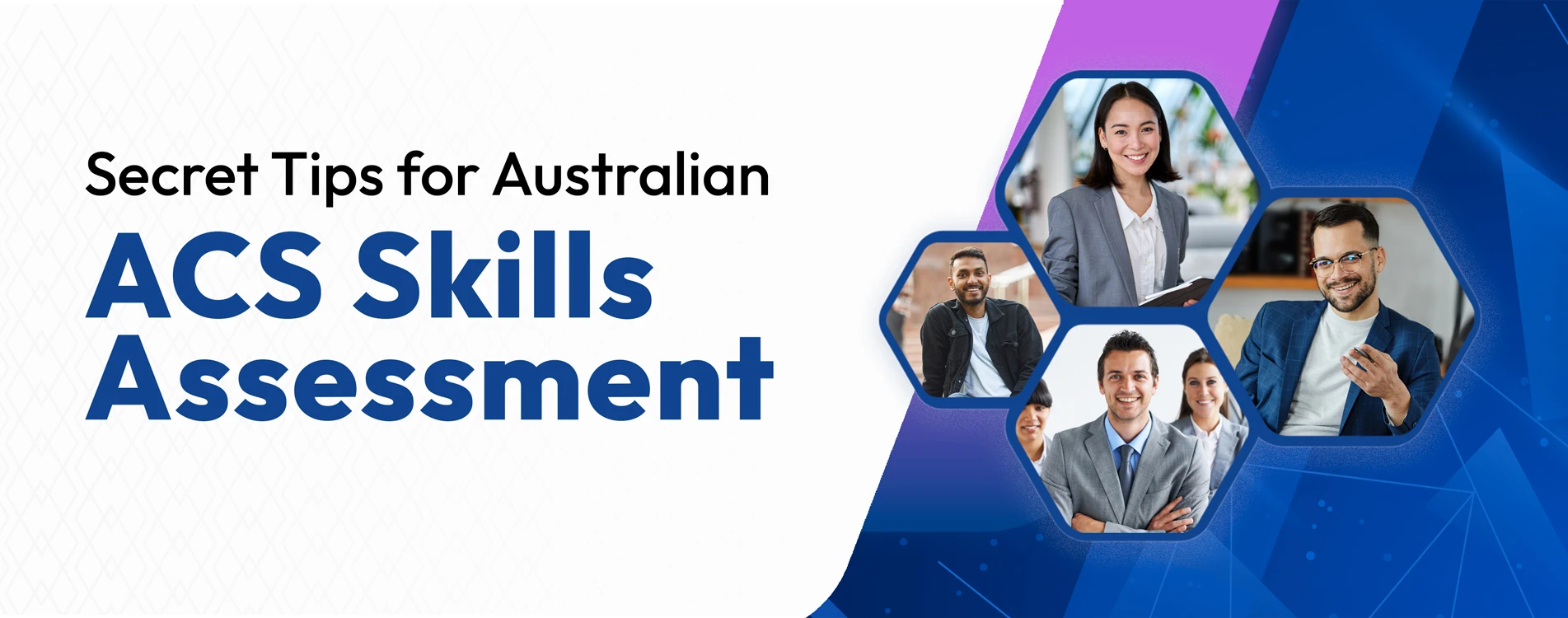
If you are planning to apply for an Australian skilled migration visa, you probably already know about the skills assessment conducted by the Australian Computer Society (ACS). The ACS skills assessment is one of the initial and major steps for Information and Communications Technology (ICT) professionals seeking PR pathways.
What is the Purpose of the ACS Skills Assessment
The purpose of the ACS Skills Assessment is to verify whether your qualifications and experience are in line with the ICT job market in Australia. To put it simply, the Australian market has certain working standards. Meeting these standards requires that you incorporate the right qualifications as well as work experience. ACS checks your qualifications and experience before you take another step toward your PR journey. After getting a positive outcome in the skills assessment, you can apply for:
- Skilled Independent Visa (subclass 189)
- Skilled Nominated Visa (subclass 190)
- or other skilled pathways based on your eligibility.
This blog will walk you through the tips and everything else you need to know to be well-prepared for the skills assessment.
Who is Eligible for ACS Skills Assessment
ICT graduates with relevant work experience are eligible to apply for the ACS skills assessment. However, there are certain nuances based on whether you are an ICT major, an ICT minor, or someone with a significant work history in this field.
Here’s why this matters:
- If you are an ICT major, that means you pursued a bachelor’s or a higher degree in ICT, and your course comprised at least 33% of ICT-based content. An ICT major requires a total of four years of experience in their field.
- If your course had less than 33% content on ICT, you are an ICT minor. You’ll require more experience to make up for the gap in qualifications.
- For individuals who do not really have formal ICT qualifications, but significant work experience in this sector, you can apply for the ACS skills assessment, given you have 6-8 years of experience backed by a detailed RPL project report.
ACS Skills Assessment Guidelines
Tips to Gain Relevant Work Experience
There are certain rules that you need to abide by to make sure your work experience is deemed relevant.
- ACS only considers skilled employment. This means that after the completion of your course, you need to pursue relevant paid work.
- This work should be at least 20 hours a week.
- Needless to say, the work you take up should be on par with your nominated occupation.
- ACS considers the years of your work experience as skilled only after deducting a few years and labelling them as a qualifying period. The number of years deducted varies depending on the qualification level and the ICT content of your course.
- Any work experience you gained before completion of your course falls under pre-qualification employment, and hence doesn’t count unless you are applying through RPL.
Document Requirements
You’ll need to provide:
- Qualification documents: Degree certificates and transcripts.
- Employment evidence: Employer reference letters (with duties, hours, salary, dates), pay slips, tax records, or bank statements.
- ID documents: Passport bio page, proof of name changes if applicable.
- RPL Report (if applying under RPL): Two detailed project reports showing your ICT skills in real-world scenarios.
Apart from the above, you might also need employment references in writing. These must comprise — name and contact details of the company, start–end dates of employment, the position you served, alignment of your role with your ANZSCO code, hours you worked per week, duly signed by an authorised person in the company with their name and position mentioned. ACS also strongly prefers official company letterhead.
Although ACS skills assessment requirements include extending all of these documents, however, submitting a document with generic or vague references isn’t an ideal thing to do. Doing so is rather a common reason for rejection.
ACS Skills Assessment Fee
The standard fee for ACS skills assessment is around AUD 530. However, if you need to access extra services, separate charges apply. For instance, if you need to add extra qualifications or experience later on, you might need to pay AUD 200-300 extra. A review or reassessment also requires you to pay an extra charge.
It is also noteworthy that the processing of your assessment usually takes 8-12 weeks before you get the result. You can, however, choose the priority processing option by paying an extra amount of around AUD 200. With priority processing, you can get your results within 10 working days.
This means that any service outside of the base fee is charged separately.
Common Pitfalls That Can Lead to a Negative Result
Any gaps or discrepancies in your documents can lead to a negative ACS skills assessment. Make sure that:
- The duties in your letter match your nominated ANZSCO occupation.
- You do not just provide HR-issued service certificates without any mention of your specific role and duties.
- You include the supporting evidence for self-employment.
- The work and study periods do not overlap, and if they do, you need to have a proper explanation for that.
Remember that ACS does not just look at your qualification level, but also assesses how much of your course comprises ICT content. For instance, a Bachelor of Science with minimal programming won’t qualify you for a Software Engineer role, even if you hold years of experience, unless you pursue the RPL route.
If you keep note of these aspects, the chances of a positive ACS skills assessment multiply.




